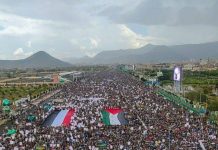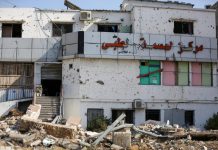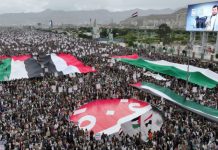Head of the National Delegation, Mohammad Abdulsalam, met on Wednesday, the Swedish Minister of Foreign Affairs, in the Omani capital, Muscat.
Abdulsalam stressed during the meeting that the unjust siege on Yemen violates international humanitarian laws. He pointed out that access to medicine and fuel is a right for the Yemeni people, even in conditions of war.
Abdulsalam pointed out to the lack of seriousness in dealing with humanitarian situation which also proves lack of seriousness in others issues. He welcomed any efforts to lift the siege and pave the way for comprehensive ceasefire negotiations.
Mohammed Abdulsalam posted on his Twitter page that such a step (lifting the siege) would be welcomed and it will prove the desire of the US-Saudi aggression to reach peace with Yemen.
Abdulsalam’s comments came a day after UN envoy to Yemen to in which he met with Sayyed Abdulmalik.
Backed by its allies, Saudi Arabia invaded Yemen in March 2015 to reinstate a Riyadh-supported regime in the country. Since then, several attempts at peace talks have failed to end the war. Six years into the aggression, more than half of Yemen’s population of 30 million now face varying levels of food insecurity, with three million children suffering from acute malnutrition.
Earlier, the head of the National Delegation said any call for an end to the years-long Saudi-led aggression is insincere as long as the crippling Saudi blockade against the country persists.
“We do not consider any call for peace serious unless it includes the complete lifting of the blockade. However, we have not yet noticed any seriousness to stop the aggression,” Abdulsalam said in a tweet on April 16.
“The calls for peace issued by some international bodies reveal a selective perception of peace by granting it to the countries of aggression and preventing it from Yemen, while peace is either for all or there is no peace,” he added.
More than 100,000 lives have been lost since Saudi Arabia and its allies launched the war on Yemen, according to estimates by the US-based Armed Conflict Location and Event Data Project (ACLED), a nonprofit conflict-research organization.



























